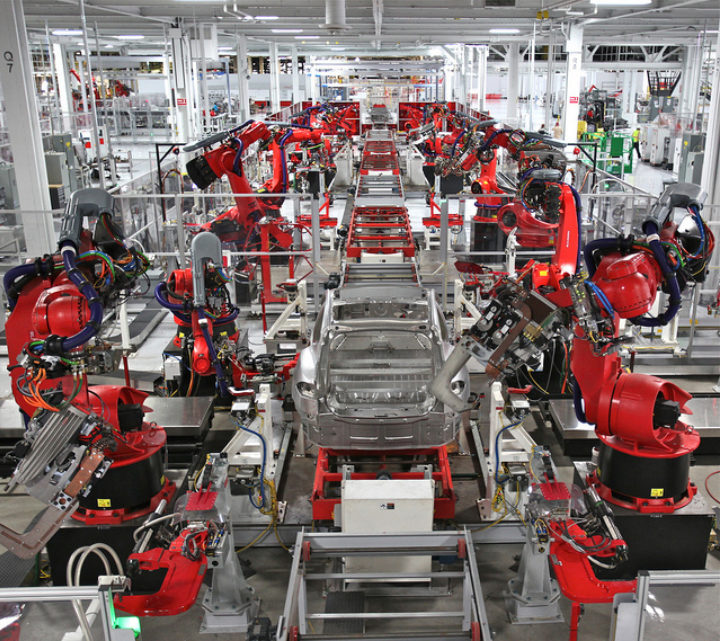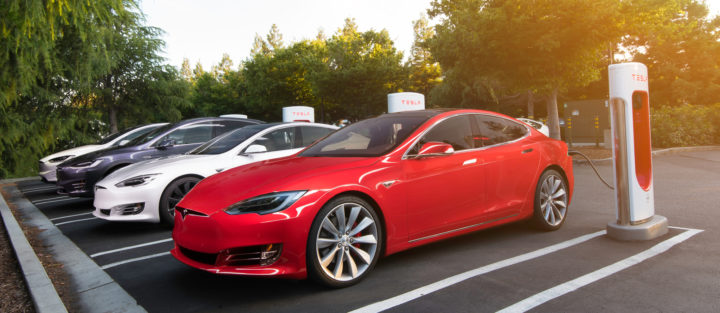Accelerating to win? Or to Not Lose?
An industrial strategy must convince the car manufacturing industry to invest in electric vehicle technology
By Pippa Henderson
Share
Last updated:
Industrial Strategy. No-one really knows what it is. After all, three decades ago our then kick-ass no-nonsense female prime minister implemented the policy of deliberate laissez-fairedness (if that is a word). No picking winners, or even winning industries. Just let the market do what it does.
However, in this brave new post-Brexit world, led by our current kick-ass no-nonsense female prime minister, all that is changing. We have to relearn what an industrial strategy is and how to implement one.
The Government has stated that we will focus our new strategy on the industries and technologies that give the UK a competitive advantage (and for competitive advantage, read export revenues). And Business, Energy and Industrial Strategy Secretary Greg Clarke recently said that energy and clean technology are central to the government's vision of the future.
As any business leader will tell you, it helps if your goods and services have a clear, defined market. And it really helps if that market is expanding. Capturing market share early on and becoming the incumbent is really the way to nail it - look at Apple and smart phones, or Microsoft and computer operating systems.
It also helps if you’re not starting from scratch and already have some form of embedded advantage - like, for instance, an industry that already employs nearly 158,000 people and turns over nearly £70 billion each year.

A thriving industry
Yep, despite there not being any British owned mass car manufacturers, car manufacturing in the UK is booming. In total, 1.59m cars were made in the UK in 2015, of which 1.23m were exported - earning the UK £34.6 billion. 57.5% of those exports went to the EU. Europewide, only Spain (2.2m) and Germany (a whooping 5.7m) made more cars. (Europe’s figures are dwarfed by China and Japan, though, which made 21.1m and 7.8m respectively).
The industry is not very evenly distributed, though. Around 50,000 - one third - of the total people employed are in the West Midlands, which is gradually becoming the global specialist in high end cars (think Jaguar, Land Rover and Aston Martin). These high-end cars contribute to the amazing fact that the West Midlands actually has a trade surplus of £1.74 billion with China (perhaps the first meaningful embodiment of the government’s PR phrase, the ‘Midlands Engine’).
We Brits also love our cars. UK drivers cumulatively drove a staggering 247 billion miles in 2015, and this accounts for 89% of all passenger miles. We registered a record 2.63m new cars in 2015 - which perversely means that the vast majority of cars we make are exported, but the vast majority of cars we drive are imported.
It goes without saying, but the vast majority of these cars have combustion engines. In the UK, electric vehicles (EVs) represent less than 2% of total car sales.
But although small, this is a rapidly growing market, which is acknowledged as the clear future industry trajectory by manufacturers and governments alike. Predicting exactly when EVs will become the dominant mode of personal transport is almost impossible, but we do know their numbers are inexorably on the rise.
You can gain a glimpse of the future and Britain’s potential place in it by looking at the Formula E electric grand prix series. Started in 2014, the single initial design had British electric motors, batteries and gearboxes. For next season, though, companies in France, India, China and the US will be joining the fray. The global race is on.

It’s clear that both Mr Clarke and Chancellor Philip Hammond also believe that EVs are the future, and that the UK should be fully involved in that future. Indeed, just last week Mr. Hammond promised £390 million will be spent on ‘future transport technologies’. This is handy for the climate, because transport currently has the highest carbon emissions of any sector of the economy.
EVs also offer a big boon to the power sector if Britain plans to implement the National Infrastructure Commission's recommendation of building a smart, flexible, low-carbon grid, in that when hooked up to the grid (as commuter vehicles, for example, would be for most of the day) EVs basically become electricity storage units, enabling ever cheaper renewable generation to be ‘spread’ across the day.
Big business doesn’t particularly care about climate change, but it does care about tax - and the Chancellor played a blinder by giving big business a massive tax break when it comes to EV charging infrastructure - any money they spend on chargers can be deduced from their tax bill. This measure expires in 2019 though, so big business had better put its foot down.
This goes hand in hand with a recent announcement that the Government will provide a grant to small business workplaces of up to £300 per socket to install charge points on their premises. Ministers are also making £2.5m available to councils to install charge points near homes without private off-street parking. All this comes on top of our existing EV policies: currently when you buy an EV it is subsidised by up to £4500 while installation of charge points at home is also already subsidised to the tune of 75% of the total cost.
There are other, more sporadic policies too. For the first time in the UK, EVs will have their own dedicated lane as of next year (woo hoo!), just outside Nottingham. But it will be only be six miles long (oh). And the Government has pledged £35m to create an automotive business zone just outside Coventry.
And further afield?
The worldwide EV market is also rapidly growing.
There is a bit of a meme in the UK - possibly driven by Tesla’s loud-mouthedness - that the US is the world leader. It is not. When it comes to sales, China wins hands down, selling 146,000 units last year and expecting to sell 450,000 EVs by the end of this year. Interestingly, Europe is number two, with 145,000 unit sales in 2015 (interestingly as - don’t forget - we currently export some 600,000 cars to the continent, and the gasoline car sales chain is exactly the same as the EV sales chain).

Within Europe, Norway and the Netherlands are the clear leaders, selling just under 45,000 and 35,000 units in 2015 respectively. Indeed EVs account for a massive 18% of new sales in Norway.
The reason Norway and the Netherlands are Europe’s leaders is simply down to policies. Norway introduced a raft of measures that make EVs more appealing, including an exemption from VAT, waiving charges on toll roads and ferries, allowing access to bus lanes and giving free parking in major towns and cities. Perhaps most strikingly, both the Netherlands and Norway are planning to ban the sale of all fossil fuel-based cars by 2025.
Germany is also debating a ban, but by the later date of 2030. There is a good chance that this will turn out to be a redundant policy, as buying a petrol or diesel car in 2030 is unlikely to make sense. Bloomberg New Energy Finance predicted recently that the total cost of (unsubsidised) EV ownership would fall below petrol and diesel cars around 2022.
There is ambition elsewhere too. Poland aims to have one million EVs on its roads by 2025. German ambition is even greater - it plans to beat Poland to the million EVs milestone by five years, and is backing this up with a planned €1 billion subsidy boost over the next three years.
Perhaps most ambitious is a draft EU directive that would require every new or refurbished house to be equipped with an EV charging point by 2019. This directive is unlikely to apply in post-Brexit Britain, even though, just like EU energy efficiency rules on electrical goods, it would almost certainly benefit Britons.
What about the rest of the world?
Further abroad, California - already an EV leader with over 223,000 sold to date - has set itself a target of getting 1.5 million on the road by 2025. To do this, it is actively targeting low-income purchasers by offering higher rebates to lower earners. This is backed up at the federal level with a recent White House announcement that it is to establish EV charging corridors along nearly 25,000 miles of highways. Further north, Quebec has effectively required its car sellers to ensure that 3.5% of new sales are electric.
However, China has set itself the most impressive targets, mandating that 8% of new cars sold be electric by 2018, and 12% by 2020. For context, China sold 21.1 million cars last year. 8% of that is 1.688 million.
In other words, China plans to sell more electric vehicles in just two years time than the UK makes in total.
Not only does that make all other worldwide targets look puny, but it would have the effect of completely changing the structure of the global EV market in unknown ways. If you haven’t heard of NextEV (and its ultra-sexy new £1m electric supercar) or BYD, you will soon.

Worldwide, the direction of travel is clear. The future is electric. Viewed optimistically, all these foreign governments increasing the demand for EVs only serves to increase the size of the UK’s potential export market. Positioned correctly, the UK could earn some serious money from EVs.
However, viewed pessimistically, those same policies are destroying demand for the UK’s existing gasoline vehicle market - especially as the UK’s specialism lies in the high-end products whose owners are uniquely able to go electric just for the cool of it. So just to maintain market share the UK has to make the transition to electric regardless. And if the transition is happening regardless, it would be remiss - even downright bizarre - if we didn’t try and grab some of that massive future worldwide EV market share.
As I’ve shown, we’re not the only drivers in this race. But this is still the first lap. So the big question is, are the UK’s policies enough to ensure the we run ahead of the pack and claim a podium place? Given that countries’ export ambitions are generally boosted by having a successful domestic market for the products in question (think Germany for cars, France for wine or New Zealand for sheep), is Government accelerating domestic EV demand quickly enough to shift the car industry’s thinking? Or does it not matter? Is China - due to its size - going to take the chequered flag regardless? Or maybe there will in fact be several global markets for EVs - luxury, sports, mass-market, etc - and hence multiple opportunities for dominance?
Whatever future policies are used, if the UK wants to stake a leadership claim it will be critical to convince the car manufacturing industry to invest in electric vehicle technology. The first ambition should be to become the EV focal point for Europe; this also means setting up policies to attract and keep major battery manufacturers.
In short, as ministers develop the UK’s new industrial strategy, it’s clear that electric vehicles offer opportunities for jobs and GDP. Britain already has many of the skills required. The policy cupboard is beginning to be stocked; there are options for rehabilitating beleaguered sectors such as steel, and creating new ones such as battery manufacture. Whatever Brexit means (apart from Brexit, obviously), the EV market is going to be global, and so the jobs and GDP could end up anywhere. Given the pace of change, decisions that Mr Clarke and Mr Hammond make over the next few years will be critical in determining whether they end up in the UK.
Share